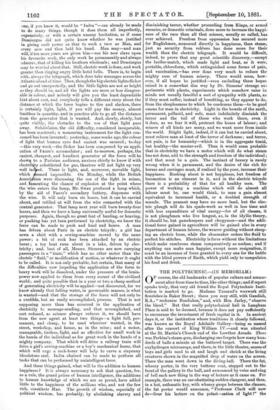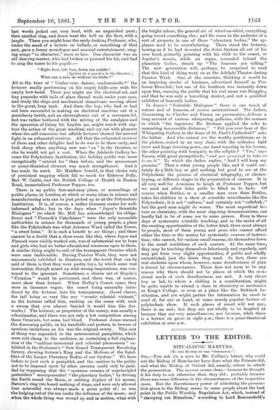THE POLYTECHNIC.—(IN MEMORIAM.)
OF course, the old landmarks of popular culture and amuse- ment alter from time to time, like other things ; and if report speaks truly, that very old friend the Royal Polytechnic Insti- tution is marked to go. Madame Tussaud's waxwork still flourishes in Baker Street ; there you may still, with Gandish, R.A., " reckonise Boadiehea," and, with Mrs. Jarley, " observe the blood." But that really polytechnical hall in Laugh= Place is said to be doomed, because it does not pay sufficiently to encourage the investment of fresh capital in it. In ancient days it, or the institution whose traditions it closely followed, was known as the Royal Adelaide Gallery—being so named after the consort of King William IV.—and was situated at the St. Martin's Church end of the Lowther Arcade. There was Perkins's steam-gun, discharging one forgets how many hun- dreds of balls a minute at the battered target. There was the oxyhydrogen microscope, and there, in the little theatre, scores of boys and girls used to sit and laugh and shriek at the living creatures shown in the magnified drop of water on the screen. There the man went down in the diving-bell. There the fat, wheezy porter, in the very buttony coat, stepped out to the front of the gallery in the hall, and announced by voice and ring of bell each new thing in the way of lecture as it came on. For example, there was an ear-shattering sudden clangour, and then, in a hot, asthmatic key, with wheezy gasps between the clauses, the fat porter would announce, "Professor Clark will now de—liver his lecture on the polari—sation of light !" the
last words jerked out very loud, with an anguished pant ; then another ring, and down went the bell on the floor, with a jangle. There you might hear the seedy-looking Professor, who, under the mask of a lecture on ballads, or something of that sort, gave a funny monologue and musical entertainment, sing- ing songs "in character," more or less. One character was an old dancing-master, who had broken or pawned his kit, and had to sing the tunes to his pupils :—
" Right foot, left foot, down the middle !
[Spoken in a passion to the dancers.] What can a man do without his fiddle P"
All to the tune of " Voulez-vous danser, mademoiselle ?" the lecturer madly performing on his empty fiddle-arm with his 'empty bow-hand. There you might see the electrical eel, and buy peacocks with tails of glass thread made under your eyes, and study the ships and mechanical steamboats moving about in the great, long tank. And there the boy, who had or had not been successful in making an electrical machine out of a gooseberry-bottle, and an electrophorus out of a saucepan-lid, but was rather bothered with the mixing of the amalgam and the operation of lining his Leyden jar, might watch with rap- ture the action of the great machine, and cry out with pleasure when the self-conscious but affable lecturer showed the auroral light in an exhausted receiver. All that the exhausted receiver of these and other delights had to do was to be there early, and look sharp when anything new was "on " in the theatres, or else he would not get a seat. When the Adelaide Gallery be- came the Polytechnic Institution, the holiday public was more energetically " catered for " than before, and the amusement or quasi-theatrical element was much strengthened. And it has made its mark. Mr. Matthew Arnold, in that choice vein of persistent nagging which did so much for Elderess Polly, Rev. W. Cattle, and the British College of Health in Euston Road, immortalised Professor Pepper, too.
There is no public free-and-easy place, or assemblage of public places, in London, at which so many ideas in science and manufacturing arts can be just picked up as at the Polytechnic Institution. It is, of course, a rather tiresome corner for well- informed adults ; but in the days when " Joyce's Scientific Dialogues " (to which Mr. Mill has acknowledged his obliga- tions) and " Pinnock's Catechisms" were the only accessible authorities in science for thousands of young people, a place like the Polytechnic was what Artemus Ward called the Tower,
a sweet boon." It is such a benefit to see things ; and there cannot be a doubt that a show-room like this, where Joyce and Pinnock were visibly worked out, was of substantial use to boys and girls who had no better educational resources open to them. A similar thing might be said of the transparent Orreries which • were once fashionable. During Passion Week, they were not uncommonly exhibited in theatres, and the worst that can be said of them is that they were pretty toys, by which some real instruction, though mixed up with wrong impressions, was con- veyed to the ignorant. Sometimes, a chorus out of Haydn's '" Creation" would be performed, and there was, of course, more show than lecture. When Halley's Comet came, they were in immense vogue, the comet being naturally intro- duced by the lecturer into his transparency. (Loud cheers, the tail being so very like our " erratic celestial visitant," as the lecturer called him, rushing on the scene with such a swoop that you almost fancied it would hiss like fire- works.) The lecturer, or proprietor of the orrery, was usually a schoolmaster, and there was not only a hot competition among these Orrerists, but some bad blood. Professor Jones warned 'the discerning public, in his handbills and posters, to beware of spurious imitations, as his was the original orrery. This sort of thing was expanded in the astronomical pamphlets, which were sold cheap to the audience, as containing a full explana- tion of the "sublime terrestrial and celestial phenomena" ex- hibited in the Professor's " New Grand Transparent Revolving Orrery, showing Saturn's Ring and the Motions of the Satel- lites of the Larger Planetary Bodies of our System." We have before us just such a pamphlet, and the caution to the public not to be imposed upon by other orreries could only be justi- fied by supposing that the " spurious orreries of unprincipled pretenders" misrepresented " the planetary bodies," by driving the Earth round the Moon, or robbing Jupiter of his moons. :Saturn's ring (we heard nothing of rings, and were only allowed lour asteroids) was always made a great point of ; so was the bulging-out of the sea under the influence of the moon; and when the whole thing was wound up and in motion, what with
the bright colour, the general air of whirl-on-whirl, everything going round something else ; and the sense in the audience of a sort of property in one of those " planetary bodies," the ap- plause used to be overwhelming. There stood the lecturer, bowing as if he had invented the Solar System all out of his own head, genteelly pointing with his stick to the comet, or Jupiter's moons, while an organ, concealed behind the planetary bodies, struck up " The heavens are telling." The new generation will, perhaps, be surprised to read. that this kind of thing went on at the Adelphi Theatre during Passion Week. One of the orrerists, thinking it would be an imposing stroke of business, advertised himself as Pro- fessor Herschel ; but one of his brethren was instantly down upon him, warning the public that his real name was Braggles, and that he was only a travelling dentist, and not a qualified exhibitor of heavenly bodies.
In Joyce's " Scientific Dialogues " there is one touch of nature and of humour, of course unintentional. The father, discoursing to Charles and Emma on pneumatics, delivers a long account of various whispering galleries, with the manner in which " the ingenious Mr. Derham applied the echo to measuring inaccessible distances." " Did you ever hear of the Whispering Gallery in the dome of St. Paul's Cathedral ?" asks the father. And who cannot see the worthy gentleman, as in the picture, seated in an easy chair, with the orthodox bald brow and large dressing-gown, one hand reposing in his bosom, the other pointing with benignity to the ecliptic ? " Yes," says Emma, with great promptitude, "and you promised to take us to see it." To which the father replies, "And I will keep my promise." That is what young people like, and it could cer- tainly do a little boy or girl nothing but good to see at the Polytechnic the process of electrical telegraphy, or electro- typing, or different stages in the preparation of cameos. It is all very well for Arminius to laugh at Professor Pepper, but we need not allow false pride to blind us to facts. Of course, when Bottles, or a smaller man even than Bottles, takes his children to a show of scientific miscellanies like the Polytechnic, it is not " culture," and certainly not " cultchah ;" but the good man might do worse. The most superficial lec- ture on chemistry, with the most clap-trap demonstrations, can hardly fail to be of some use to some person. Even in these days of systematic scientific teaching, and in the midst of all the existing opportunities of the better kind, there must always be people, most of them young and poor, who cannot afford. either the time or the money for systematic courses of instruc- tion ; who cannot, for various small reasons, tie themselves down. to the usual conditions of such courses. At the same time, they may be teaching themselves laboriously and regularly, and may get from very slight opportunities, if public and wholly unrestricted, just the hints they need. In fact, there are real students upon whom, however, some desultoriness of plan is forced by circumstances. There does not seem to be any reason why there should not be places at which the occa- sional needs of such desultoriness are met. A very clever boy or lad, to whom a shilling is a consideration, might be quite unable to attend a class in chemistry or mechanics at King's College, or even at a place like the Birkbeck In- stitution, and yet might gather the information he stood in need of, for eye or hand, at some merely popular lecture or polytechnic show. If such places of resort will not pay, there is an end; but they are not wholly to be laughed at because they are very miscellaneous, nor because, while there is a lecture on gases at eight p.m., there is a quasi-theatrical exhibition at nine p.m.































 Previous page
Previous page